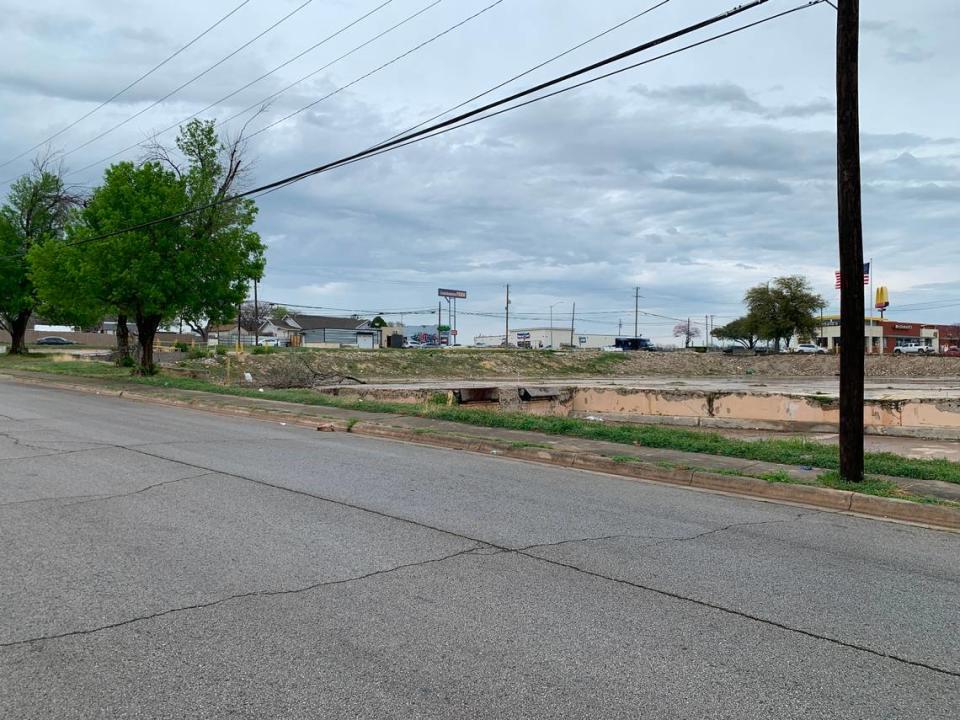Developers plan to build another hotel in north side Fort Worth. Do residents want it?
Mario Martinez leaned on his front patio fence and scanned the street, mapping out five decades of change with a few finger-points and chin raises toward the horizon.
“It was just hills,” he recalled. Long drives to and from construction sites across the Metroplex afforded him plenty of time to observe its landscape.
Martinez settled in Fort Worth in 1968. He was born in Coahuila, a Mexican state that shares a 318-mile border with Texas. His home on Ellis Avenue, where he’s spent most of his life, is compact and angular, save for two pale arches separating the porch from the lawn.
The north side of his youth now seems barely recognizable. The locally owned shops and cantinas that once lined North Main Street have faded to memory, he says. What nearby commerce exists today largely takes the form of fast food chains, cheap loan vendors and auto repair shops.
More change is yet to come. Developers plan to erect a six-story hotel within spitting distance of his front door. Some residents have welcomed the project with a mix of relief and resignation. Others fume, denouncing it as the tourism industry’s latest encroachment on a residential neighborhood fighting to maintain its character and cohesion.
‘Noise?’
The skeletal remains of the Carnival supermarket that once separated Martinez’s block from the bustle of Main Street are still visible.
The city demolished the store in 2019, 20 years after its founding and several years after it shuttered. A Chick-fil-A hatched on the property’s southern half in 2022.
The northern section — encased by Northwest 29th Street to the north, Ellis Avenue to the west, and Main Street to the east — has decayed. Rubble and felled branches rim portions of the 2.5 acre lot. Pedestrians amble about the rusted loading bay and stranded parking bollards. Drifters sometimes pitch camp in old parking spaces, Martinez complained. Teens take advantage of the lot’s darkness and relative emptiness to light firecrackers.
In February, Bryan-based property investment developer Oldham Goodwin drew up plans to erect a 149-room Hampton Inn and Suites in its wake. It applied to rezone the land from “general” to “intensive” commercial to move forward with the initiative; the city zoning commission will hear the case Wednesday. The company could not be reached for comment.
Martinez hopes the hotel will reverse the neglect. The building will illuminate the streets and motivate the city to revamp the neighborhood’s crumbling roads, he reasons. It’ll also insulate his home from the unruly drivers that plunge off the thoroughfare (and, on occasion, into his address marker).
“More security,” he explained.
Mario’s cousin, Jose, who lives next door, agreed.
“A hotel is fine,” he said, lounging in the front seat of his red Chevy Silverado in his driveway, a few yards from the empty lot. “Whatever’s good for the economy.”
Jose, 54, also grew up on Ellis Avenue. Like most of his male relatives, he spent his working years toiling on construction sites, until a disability incapacitated him.
The developer’s vision doesn’t excite his family, he admits. He doubts many north side residents would work at the Hampton Inn, let alone use it. (“I wanted a Golden Corral,” he laughed.)
The hotel’s construction promises months of clamor and dust. Its 155 parking spaces would empty right in front of their homes instead of Main Street, according to the developer’s initial site plan.
Jose settled somewhere in between acquiescence and hope.
“People can do whatever,” he said. “It’s part of life; people got to drive through.”
Mario, in his late 60s with rich pepper hair, exuded more ease.
“Noise?” he asked rhetorically with an exaggerated lift of the eyebrows. He waved his hand as if to dispel the worry.
“I don’t lose sleep over it.”

Whose north side?
It would take a lost tourist about nine minutes to bumble from the Fort Worth Stockyards to Mario’s front gate.
The crown jewel of the city’s tourism sector is surrounded by residential neighborhoods —predominantly Latino and working class. Millions of visitors and dollars flow through the site every year.
The city has pledged millions more to spruce up its streets and revamp its infrastructure. Developers have taken the cues, pouring cash into new hotels and stores. In December 2019, Oldham Goodwin opened a SpringHill Suites a few blocks further down Main Street from its latest proposal.
Some north side natives embrace the tourism-focused development as welcome and necessary investment in the area. Others bristle, claiming the community reaps few of the growth’s benefits but most of its costs.
News of the Hampton Inn made rounds on city and neighborhood chat groups last week. Many residents chafed and grumbled.
“Nooooo more pls we need peace like we are before,” one commented.
“God Please No.. Growing up in Northside there was no Chic Fil A, Starbucks, Shake Shacks, or hotels,” another chimed in. “Now there’s all of those things within a two mile radius. Insane traffic in the same streets I’ve always driven in.”
Others see opportunities where their neighbors see peril.
“Why would this be an issue?” one resident asked. “Wouldn’t that be good. It would open some employment.”
Gladys Guevara, a member of the North Side Neighborhood Association, sympathizes with both arguments but skews skeptical.
“I agree with development, but there has to be genuine belief that they’re listening to what the community has to say,” she told the Star-Telegram. (Her views don’t reflect those of the entire organization, she stressed.)
Guevara, 29, grew up in south Fort Worth. She moved to its northern sister district seven years ago to live with her husband, a generational north sider.
She waded into neighborhood advocacy last year, after witnessing the tides of development sweep up her neighbors and loved ones with little consideration for their interests.
“I think we’re just catching up,” she said. “I don’t think the community is reaping it as much yet.”

